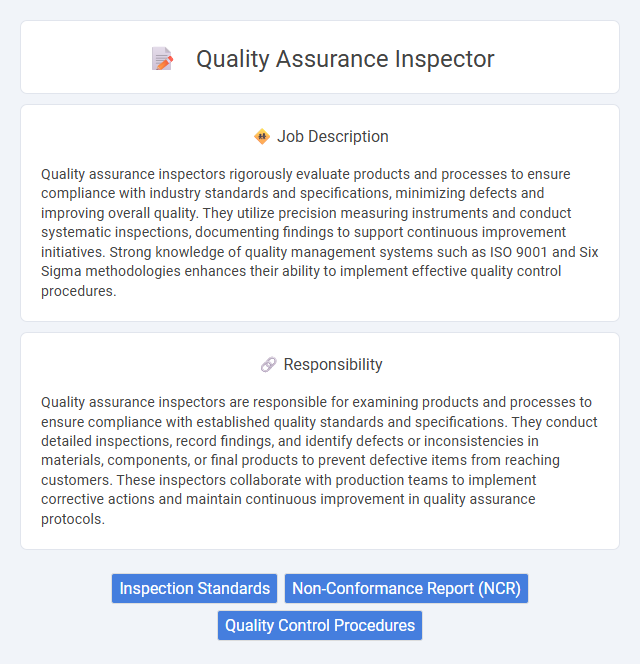
Quality assurance inspectors rigorously evaluate products and processes to ensure compliance with industry standards and specifications, minimizing defects and improving overall quality. They utilize precision measuring instruments and conduct systematic inspections, documenting findings to support continuous improvement initiatives. Strong knowledge of quality management systems such as ISO 9001 and Six Sigma methodologies enhances their ability to implement effective quality control procedures.
Individuals with strong attention to detail and excellent observational skills will likely be suitable for a Quality Assurance Inspector position. Those who can consistently identify defects and maintain focus under repetitive tasks probably adapt well to the demands of this role. It is less probable that candidates who struggle with precision or concentration will perform effectively in this job.
Qualification
Quality assurance inspectors require a strong foundation in industrial engineering, manufacturing, or quality control, typically supported by a high school diploma or equivalent, with many employers favoring candidates holding associate or bachelor's degrees in related fields. Proficiency in reading blueprints, understanding measurement tools, and knowledge of ISO standards such as ISO 9001 is crucial for accurately assessing product quality and compliance. Hands-on experience with inspection equipment, attention to detail, and skills in documenting findings using quality management software enhance a candidate's effectiveness in maintaining production standards.
Responsibility
Quality assurance inspectors are responsible for examining products and processes to ensure compliance with established quality standards and specifications. They conduct detailed inspections, record findings, and identify defects or inconsistencies in materials, components, or final products to prevent defective items from reaching customers. These inspectors collaborate with production teams to implement corrective actions and maintain continuous improvement in quality assurance protocols.
Benefit
Quality assurance inspector roles likely offer benefits such as enhancing product reliability and customer satisfaction by identifying defects early in the production process. These positions often provide opportunities for skill development in analytical and technical areas, increasing career growth potential. Employers may also offer competitive salaries and health benefits, making this a potentially rewarding career choice.
Challenge
Quality assurance inspectors likely face the challenge of maintaining consistent product standards amid varying manufacturing processes and materials. They may encounter difficulties in identifying subtle defects that could impact overall quality and customer satisfaction. Navigating strict regulatory requirements while ensuring efficient inspection workflows probably demands high attention to detail and adaptability.
Career Advancement
Quality assurance inspectors play a critical role in maintaining product standards and compliance across manufacturing and production industries. Advancing in this career often involves gaining specialized certifications such as ASQ Certified Quality Inspector or transitioning to roles like Quality Control Supervisor, Quality Manager, or Process Improvement Specialist. Experience with industry-specific standards like ISO 9001 and proficiency in statistical quality control software significantly enhance promotion opportunities and salary growth.
Key Terms
Inspection Standards
Quality assurance inspectors ensure products meet industry standards by conducting thorough inspections based on established criteria such as ISO 9001 or ASTM guidelines. They meticulously examine materials, processes, and finished products for compliance with specifications, identifying defects and deviations early to prevent faulty outputs. Their role involves using precise measurement tools and detailed documentation to maintain high-quality production standards and support continuous improvement efforts.
Non-Conformance Report (NCR)
A Quality Assurance Inspector plays a crucial role in identifying and documenting defects through Non-Conformance Reports (NCR), ensuring compliance with industry standards and project specifications. Detailed NCR documentation facilitates effective communication between quality teams and production, enabling timely corrective actions and preventing recurrence of defects. Proficiency in analyzing NCR data helps improve overall product quality and supports continuous improvement initiatives within manufacturing and construction environments.
Quality Control Procedures
A Quality Assurance Inspector ensures products meet specified standards by rigorously implementing quality control procedures such as inspection, testing, and documentation. They analyze production processes to detect deviations, conduct audits, and enforce compliance with industry regulations like ISO 9001. Mastery in interpreting technical specifications and utilizing statistical process control tools enhances defect detection and supports continuous improvement initiatives.
 kuljobs.com
kuljobs.com